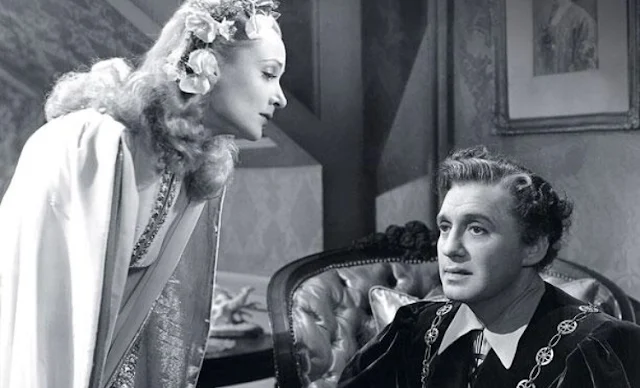 |
| Clark Gable and Hedy Lamarr in Comrade X |
Comrade X is one of those "what could they have been thinking" movies. It's a farce about international relations made as Europe was skidding into nightmare. Hitler and Stalin had just signed their infamous pact and the Germans were beginning to bomb London. Although the United States was still officially neutral, it was clear that everything was about to be sucked into a major war. So why make such a silly movie about the love affair of an American reporter and a beautiful Soviet streetcar conductor? Actually, it's quite clear what MGM was thinking: Ninotchka (Ernst Lubitsch, 1939) was a hit, and we've got this new star Hedy Lamarr who has an accent, and Clark Gable's available, so why don't we put them in a kind of remake? Walter Reisch, who worked on the screenplay for Ninotchka, can surely come up with some sort of variation on the theme of lovely Russian commie seduced by Western capitalist, and we can get some reliably funny writers like Ben Hecht and Charles Lederer to punch up the dialogue. We can even throw in some of the guys from the cast of Ninotchka that we've got under contract, like Felix Bressart and Sig Ruman. Write a part for a wisecracking dame like Eve Arden and hire a top director like King Vidor, and what could go wrong? Pretty much everything, as it turned out. Comrade X's lampoon of Soviet spycraft and censorship would look rather odd only a couple of years later, when the United States entered the war and found itself allied with the Soviets. The comedy turned sour when references to mass executions found their way into the script. Lamarr is pretty and Gable is virile but they don't really connect. And the plot climaxes with an absurd scene in which the protagonists steal a tank and lead a whole battalion of tanks (pretty obviously miniatures) on a chase that ends with all of them plunging off a cliff. It's as clumsy as that sounds. Hecht and Lederer do contribute a few bright lines: "You can't have a revolution in a country where the people love hot dogs and boogie-woogie." There's some fun in the character bits contributed by Bressart, Ruman, and Oskar Homolka, and in Arden's acerbic asides. But the whole thing feels cobbled together from leftovers and uninspired by original thought.
